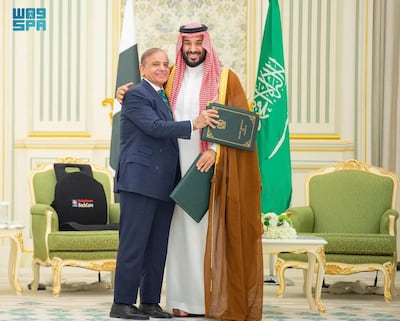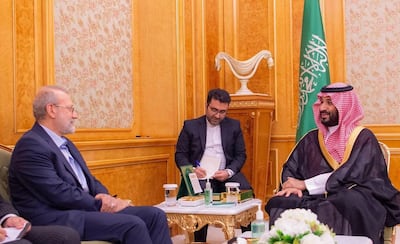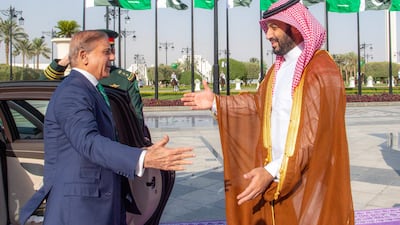Saudi Arabia and Pakistan have signed a sweeping defence pact, marking a significant deepening of military co-operation between the two long-time partners. The agreement adds a new layer to the Gulf’s recalibrating security architecture.
It commits the two nations to treat any act of aggression against one as aggression against both. It also covers joint deterrence, intelligence sharing and military training, effectively formalising a relationship that has existed for decades. The kingdom has long maintained close economic, religious and security ties with Pakistan.
The move comes amid heightened regional tensions. Last week, Israel attacked members of the Hamas leadership in the Qatari capital Doha, an attack that raised questions about US security guarantees in the region, as one ally struck another.
While US President Donald Trump said he was not informed of the attack beforehand, and Israeli Prime Minister Benjamin Netanyahu described the Qatar raid as a “wholly independent decision by Israel”, the episode demonstrated Washington’s limited ability, or willingness, to prevent Israeli action against a key regional partner.
Analysts say the pact between Saudi Arabia and Pakistan highlights the kingdom's drive to strengthen its security posture beyond its traditional dependence on the US. It is both a signal of intent and a hedge – a way for Saudi Arabia to diversify its security partnerships.
“It’s less about breaking with the US and more about Riyadh signalling deep frustration with the US after Israel’s attack on Qatar, a fellow GCC country,” Firas Maksad, managing director for Middle East and North Africa at Eurasia Group, wrote in a post on X, referring to the Gulf Co-operation Council.
“[Saudi Crown Prince Mohammed bin Salman] is telling Washington: we’re diversifying our options. But Saudi Arabia still is and will remain dependent on the US for security. This is hedging, not decoupling. Deepening defence ties to Europe is also a possibility.”

The US has deep-rooted security commitments in the Gulf, with tens of thousands of troops and advanced military assets that can surge rapidly to address emerging contingencies. But Riyadh and other Gulf states have sought in recent years to diversify their defence partnerships, and this pact underscores that strategy.
While the US remains a vital ally, Gulf countries are looking to reduce reliance on any single power and strengthen their strategic autonomy.
This includes acquisitions such as Turkish and Chinese UAVs, South Korean surface-to-air missiles, and, in the UAE’s case, Chinese L-15 trainer jets and Russia’s Pantsir point-defence system. Qatar has strengthened defence ties with Turkey, focusing on joint exercises and agreements on military technology.
Qatar was attacked twice this year. During the 12-day Israel-Iran war in June, Tehran struck Al Udeid Air Base in retaliation for US air strikes on its underground nuclear sites. The base hosts American military personnel.
The incidents have amplified Gulf security worries. The same happened in 2019, when Iran was blamed for the Aramco attack in Saudi Arabia. The issue resurfaced this year when the US joined Israel in its conflict with Iran, despite Gulf states pushing for a diplomatic resolution.
Implications for Iran
The Saudi-Pakistan defence pact aligns two of Iran’s largest neighbours in a defensive alliance, raising the possibility that Pakistan’s nuclear deterrent could extend over Saudi Arabia.
A Saudi official told Reuters that “this is a comprehensive defensive agreement that encompasses all military means” when asked whether Pakistan would be obliged to provide a nuclear umbrella under the pact. Observers say this development could be a source of concern for Tehran.
Saudi Arabia has sought US assistance to advance a civilian nuclear power programme, which was reportedly tied in part to a proposed diplomatic recognition deal with Israel before the 2023 Hamas attack. Prince Mohammed had previously said the kingdom would pursue nuclear weapons if Iran developed them.
There has been intensified Saudi-Iranian engagement over the last few days. Prince Mohammed held talks with Iranian President Masoud Pezeshkian on Monday on the sidelines of the emergency Arab-Islamic summit that took place in Doha in response to Israel’s attack on Qatar. The following day the Saudi Crown Prince received Iran’s top security chief Ali Larijani in Riyadh.

Later, Mr Larijani met the Saudi Defence Minister Prince Khalid bin Salman. In April, Prince Khalid met with Iran’s Supreme Leader Ali Khamenei in the Iranian capital and delivered a letter from King Salman. The message warned, according to reports, that Israel was seeking a pretext for escalation and urged Iran to engage with Washington over its nuclear programme. In June, Israel struck Iran’s nuclear facilities.
Pakistan remains the only nuclear-armed Muslim-majority nation and commands the Islamic world’s largest army, which it has repeatedly said is focused on deterring its arch-rival India. The two neighbours engaged in a direct military confrontation in May.
India's ministry of external affairs spokesman, Randhir Jaiswal said in a post on X on Thursday that India was aware of the development, adding it would study its implications for New Delhi’s security and for regional stability.




